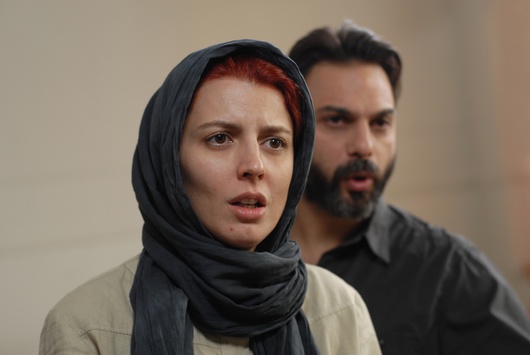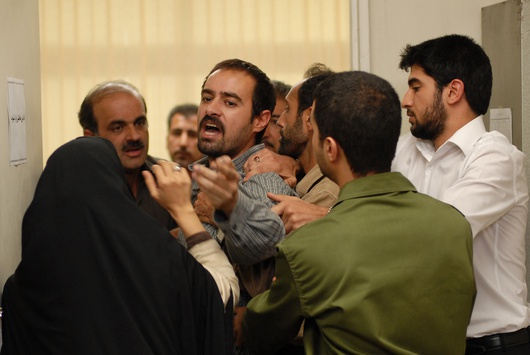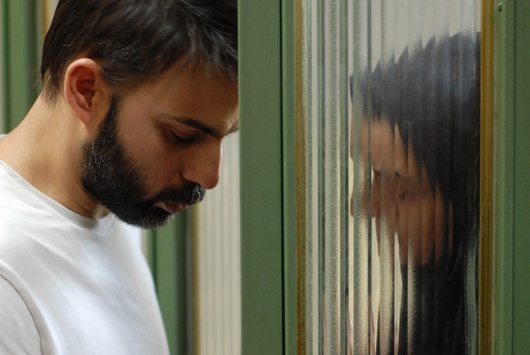Berlin film festival 2011 winner goes to Iran: Asghar Farhadi's Nader and Simin: a Separation
Published on
by Sandra Wickert
In 2009 the Iranian director scooped a Silver Bear for best director for About Elly. This year's competition entry Nader and Simin, a Separation ('Jodaeiye Nader az Simin') was a clear frontrunner for the 2011 Golden Bear award, beating twenty-one other films in competition.
 Simin (Leila Hatami) is on the verge of a nervous breakdown. After an eternity her family has managed to secure her a travel visa to find a better life abroad, but her husband Nader (Peyman Mooadi) wants to stay in Iran because of his father (Ali-Asghar Shahbazi) who needs care for his Alzheimer's condition. He threatens Simin's departure with divorce and custody of their eleven-year-old daughter. Nader is a good husband, his daughter loves him, he is quite liberal and is active in the household – no reasons to justify a divorce for the eternal civil servant. As Simin moves to her parents house for two weeks to show that she means it, fate takes its own course.
Simin (Leila Hatami) is on the verge of a nervous breakdown. After an eternity her family has managed to secure her a travel visa to find a better life abroad, but her husband Nader (Peyman Mooadi) wants to stay in Iran because of his father (Ali-Asghar Shahbazi) who needs care for his Alzheimer's condition. He threatens Simin's departure with divorce and custody of their eleven-year-old daughter. Nader is a good husband, his daughter loves him, he is quite liberal and is active in the household – no reasons to justify a divorce for the eternal civil servant. As Simin moves to her parents house for two weeks to show that she means it, fate takes its own course.
 Nader and Simin is a complex film: it's about taking care of your elders, the excessive demands of relatives, feelings of responsibility versus personal freedom, lies and ensnarement. The current political and religious situation in Iran is almost additionally but always present. Whilst Nader and Simin stand for the progressives who want a new Iran, the impending carer of the demented father Razieh (Sareh Bayat) embodies the incredibly religious part of the population. On the one hand you have Nader, who is trying to raise his young daughter to develop her own way of thinking and sense of responsibility, as well as Simin, who is completely emancipated from her husband and who doesn't let anyone or anything rule her. On the other hand you have the pious Razieh (Sareh Bayat) who has to check in with a religious authority by telephone for permission before she can changer Nader's father's soiled paints.
Nader and Simin is a complex film: it's about taking care of your elders, the excessive demands of relatives, feelings of responsibility versus personal freedom, lies and ensnarement. The current political and religious situation in Iran is almost additionally but always present. Whilst Nader and Simin stand for the progressives who want a new Iran, the impending carer of the demented father Razieh (Sareh Bayat) embodies the incredibly religious part of the population. On the one hand you have Nader, who is trying to raise his young daughter to develop her own way of thinking and sense of responsibility, as well as Simin, who is completely emancipated from her husband and who doesn't let anyone or anything rule her. On the other hand you have the pious Razieh (Sareh Bayat) who has to check in with a religious authority by telephone for permission before she can changer Nader's father's soiled paints.
 Through his writing and direction Asghar Farhadi deftly mires these opposite ends of a story which suddenly is more than just black or white, where it's not completely clear what is going on, where we don't know who is lying and who is telling the truth – and whether it's all about the truth in any case. What Nader's family consider to be correct can symbolise a catastrophe for Razieh and her husband. Despite the social differences it's the three women, including daughter Termeh (Sarina Farhadi), who save their families in various ways. Meanwhile the men think more of their pride than in the general good.
Through his writing and direction Asghar Farhadi deftly mires these opposite ends of a story which suddenly is more than just black or white, where it's not completely clear what is going on, where we don't know who is lying and who is telling the truth – and whether it's all about the truth in any case. What Nader's family consider to be correct can symbolise a catastrophe for Razieh and her husband. Despite the social differences it's the three women, including daughter Termeh (Sarina Farhadi), who save their families in various ways. Meanwhile the men think more of their pride than in the general good.
Nader and Simin: a Separation is laborious because everything happens at once, because the characters are always talking over and across each other, because you can't always follow the behaviour of some of the parties involved, because you want to shake them to bring them to their senses, because you've already guessed that in the end it unfortunately won't end up well.
The 2011 Berlinale film of the year is realistic, absorbing and important: it deserves its Bear, which the director correctly devoted to jailed fellow countryman, filmmaker and honoured jury member, Jafar Panahi, who has been imprisoned for six years for 'propaganda against the regime' and banned from filmmaking for twenty years in Iran.
Film stills @Internationale Festspiele Berlin



